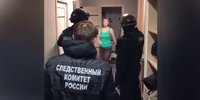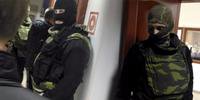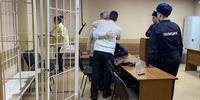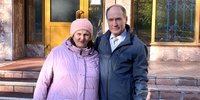The Case of Seredkin in Novosibirsk
Filter
- #
The Investigative Department of the Federal Security Service of Russia for the Novosibirsk Region initiates a criminal case against Alexandr Seredkin, Valeriy Maletskov and Marina Chaplykina under Parts 1 and 2 of Art. 282.2 of the Criminal Code of the Russian Federation. According to the investigation, Seredkin "organized meetings and led the reading and discussion of literature recognized as extremist." Maletskov and Chaplykina are accused of participating in the activity of a banned organization.
- #
The Oktyabrsky District Court refuses the investigator's request to place Alexandr Seredkin and Valeriy Maletskov in custody. Instead, they are put under house arrest. A recognizance agreement is signed by Marina Chaplykina.
- #
- #
- #
- #
Alexandr Seredkin's preventive measure is changed to a recognizance agreement. The believer spent 6 months under house arrest.
- #
He is examined by religious, psychological and linguistic forensic experts. They conclude that the content of the presented audio and video materials is consistent with the teachings of Jehovah's Witnesses, and that "A. I. Seredkin is the organizer and communication leader."
- #
Selyunin, the Senior Investigator for the Novosibirsk Region, separates the case of Alexandr Seredkin. This separate proceeding is assigned the number 12107500001000044.
- #
Investigator Selyunin names Alexandr Seredkin as an accused person.
The ruling states that “the devotion to a religious organization, the extensive knowledge of the teachings of Jehovah’s Witnesses, the desire to achieve common goals and objectives facing the religious organization, to spread the ideas and values of the teachings among the inhabitants of the Novosibirsk region, allowed Seredkin ... as their leader to organize the activity of a group of followers of the teachings of Jehovah's Witnesses."
- #
The materials of the criminal case are sent to the prosecutor's office of the Novosibirsk Region.
- #
The criminal case against Alexandr Seredkin goes to the Oktyabrsky District Court of Novosibirsk.
- #
The Oktyabrsky District Court is holding a preliminary hearing behind closed doors. The defendant Alexander Seredkin files a motion to return the case to the prosecutor, since not all the circumstances of the case were investigated when the indictment was presented, but the judge rejects it. It also leaves unchanged the measure of restraint in the form of a written undertaking not to leave and proper behavior.
- #
Due to the pandemic, no one is allowed into the courthouse. The defendant submits an application for the opportunity to make audio recordings of the hearings. The judge allows the recordings.
The judge asks Prosecutor Bulgakov to read out the charges, after which the defendant submits his written response to the charges to the judge, and also briefly draws his attention to the fact that "the activity of a legal entity was banned, and not the actual teachings of Jehovah's Witnesses."
- #
The judge asks the witness, lieutenant Grigory Lazarev, who works in the Federal Security Service of the Novosibirsk Region, to give a definition of "extremist activity", since his direct duty at work is to identify crimes of an extremist nature. The witness for the prosecution cannot give an exact definition of this term for a long time, and then searches for it on the Internet.
The judge asks questions about Seredkin and his religious activities. The witness for the prosecution explains that the defendant, having the status of a spiritual leader or “elder”, held religious meetings with fellow believers “in the spirit of the ideas and values of the teachings of Jehovah’s Witnesses”, and also “read religious literature, organized joint religious rituals, in particular, singing".
In addition, Lazarev informs the court that from July 24, 2018 to April 19, 2019, operational-search activities were conducted against Seredkin. Their results were submitted for a religious expert study, "as a result of which the experts concluded that individuals were involved in the religion of Jehovah's Witnesses."
When asked by the judge whether new participants were involved in the religious activity after the 2017 Supreme Court decision, the witness replied: “I don’t remember if there was any involvement.”
To the lawyer’s question about how exactly the continuation of the activity of the banned organization was manifested, whether Seredkin opened accounts, whether he performed operations as a legal entity, the witness explains that this included “holding meetings, reading literature, using an electronic application, leading meetings, using audio and video materials received from other participants of the banned structure.”
- #
The court is interrogating a secret witness under the pseudonym "Ivan" who says he has never heard from the defendant extremist statements, negative assessments of people who are not Jehovah's Witnesses, as well as calls for the severance of family or family relations. It affirms that it is acceptable for Jehovah's Witnesses to repay their debt to the state in a non-military manner, such as civilian alternative service.
The judge does not satisfy the believer's request to declassify the identity of the secret witness.
The defendant draws the court's attention to the fact that the secret witness makes assumptions instead of facts and is mistaken in the dates.
- #
About twenty people come to support the believer, but no one is allowed into the hall.
There is a replacement of the state prosecutor - Assistant Prosecutor Bulatov enters the case.
The Court examines all nine volumes of the case.
- #
Aleksandr Seredkin explains to the court that there are no destructive and extremist appeals at Jehovah's Witnesses services.
Commenting on the materials of the case presented by the prosecutor, the believer emphasizes the absolutely peaceful nature of the meetings of fellow believers.
- #
Alexander Seredkin testifies, reading out his written notes. He shares how studying the Bible has improved his life and the lives of those around him. The defendant also explains the difference between legal entities of Jehovah's Witnesses and individual believers. He refers to the decisions of the ECHR, which declared the persecution of Jehovah's Witnesses in Russia illegal. All documents are attached to the case file.
- #
During the debate, the prosecutor asks for a sentence of 6.5 years in prison for Aleksandr Seredkin to be served in a general regime colony.
15 people come to support Alexander Seredkin, 14 of them are allowed into the hall. The defendant draws the court's attention to the fact that the material evidence attached to the case cannot characterize Jehovah's Witnesses as extremists. He says he is a law-abiding citizen who wants to help his neighbors.
- #
Alexander Seredkin gives his last word. He says: "The indictment states that there are no victims in this case. But I do not agree with this statement. There are victims in this case - my wife and I."
The last word of the defendant Alexander Seredkin in Novosibirsk - #
After the announcement of the guilty verdict, Alexander Seredkin was placed in pre-trial detention center No. 1 in the city of Novosibirsk. Letters of support to the believer can be sent by regular mail and through the FSIN-letter system.
- #
The lawyer visits Alexander Seredkin in the pre-trial detention center. The believer says that in the first days after the verdict he had the feeling that all this was not happening to him. He recalls the applause of fellow believers in the courtroom: "Such support touched me deeply, strengthened me very much and gave me strength to endure a harsh sentence."
Upon arrival at the pre-trial detention center, the believer was quarantined in a cell without repair. According to him, "in the first two days I was shaking from the cold and I had to sleep in clothes." Two other people were held with him. One of them wondered how such an honest and kind person could be imprisoned: "I will come home, I will tell everyone that I was sitting with an innocent person."
Now the believer is in a cell with 11 prisoners. "The microclimate in the cell is good, everyone is friendly," says Alexander. "It's also cool in the cell, but there are warm clothes." Despite the difficult conditions of detention, he tries to maintain joy.
Already twice Alexander Seredkin was allowed a meeting with his wife. He is also supported by letters from fellow believers. At the time of the lawyer's visit, the believer had received 27 letters from different countries. He says that these letters are like welcome gifts to him, and he has not received so much in his entire life.
- #
Together with Alexander, 10 people are kept in the cell, they live together, they do not offend the believer. One young cellmate even gave him his lower bunk. It is not cold in the cell, there are smokers, but they do not cause discomfort. Alexander has the opportunity to walk, once he was even able to play football. He receives so many letters that he does not have time to read them. He receives all the necessary medicines on time.
- #
Aleksandr is held in a special unit, where prisoners with more serious articles are placed. He gradually adapted to his circumstances, his emotional state is stable, he does not complain about his health.
There are six people in the cell with the believer, Alexander is older than the others, therefore, according to him, he is treated kindly, like a grandfather. Only two of his cellmates smoke, and they try to do it by the window. The cell itself is located on the seventh floor, and the walking courtyard is on the first floor, so the believer considers the ascent and descent on foot as a small workout.
With his wife Svetlana, they can see each other twice a month on short dates - an hour and a half instead of the prescribed three.
Letters from fellow believers continue to arrive in large quantities - there are already about two thousand of them. As Alexander says, it gives him a lot of interesting information and encouragement.
Although almost 5 months have passed since the sentencing, an appeal hearing has not yet been scheduled. The believer is taken to court twice a month so that he can familiarize himself with the case materials. It takes several hours to get there and wait, and only 20 minutes are given for the acquaintance itself.
- #
- #
Alexander Seredkin is in the process of transferring. He is temporarily unable to receive letters.
- #
Aleksandr Seredkin is in penal colony No. 5 in the town of Rubtsovsk. He can write letters.
- #
Upon arrival at the colony, Aleksandr was in quarantine, after which the believer was placed in a punishment cell for 2 weeks. This penalty was imposed on him for taking off his jacket near the bed, and not by the shower.
After his release from the punishment cell, Aleksandr was immediately placed in strict conditions of detention, where he remains to this day. Together with him, more than 40 people are being held there. Relations with prisoners and the administration are good.
The believer additionally buys food in the colony's store, but the choice is scarce. Parcels, including medicines and vitamins that his wife sends him, have not yet been given to Alexander.
The colony's library contains the Bible in two translations. Alexander enjoys the opportunity to read it every day. The believer does not yet have a personal copy. Letters are brought to him about three times a week.
- #
- #
Aleksandr Seredkin is still being held in strict conditions of serving his sentence. The believer's condition is aggravated by headaches and back problems. Alexander is very worried about his wife Svetlana, who suffered a heart attack in January. For both spouses, the ability to make regular phone calls is a great support. They were especially pleased with the long meeting held in February.
Alexander tries to maintain a good emotional and spiritual state. Now the man has a personal copy of the Bible, reading it is of great help to him. The believer also appreciates encouraging letters from friends.
- #
The room where Aleksandr Seredkin and other prisoners are kept has been renovated. By his behavior, the believer earned the respect of others.
According to his wife, with whom he recently had a long date, the believer has lost a little weight, he lacks sunlight. However, Aleksandr has the opportunity to take care of his health: regularly exercise and drink more water. He also often visits the library, where he can quietly read and think. Seredkin still receives many letters from different countries and cities, and he tries to answer them regularly.
- #
Seredkin's health has deteriorated sharply since August. In the last few months, the believer has lost about 10 kilograms. He is in great pain and it is virtual impossible for him to digest his food. As a result of this Aleksandr was sent for a medical examination.
The believer is in touch with his family and friends. At the end of September he had an extended visit from his wife and children and recently another one took place — this time in Regional Tuberculosis Hospital No. 12 in Barnaul, where he was admitted for examination. Aleksandr is waiting for the results of the tests and follows a diet. For 2 years now (since October 2023), Seredkin has been under strict conditions of detention.
- #






